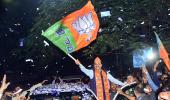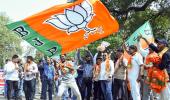'For politicians, winning the next election has become more important than economic stability of the country and broader national interest.'

Election results have increasingly become unpredictable, quite like the vagaries of the weather. As the number game hots up in various states, most psephologists get their exit polls wide off the mark, leaving behind red faces.
The Maharashtra assembly election results were stunning as the Mahayuti alliance won 234 votes out of 288 seats, with the Bharatiya Janata Party alone securing 132, while the Opposition Maha Vikas Aghadi secured a dismal 50 seats.
The run-up to the elections saw sops being promised by political parties, divisive speeches and caste equations being juggled. The Jharkhand assembly polls, however, saw the BJP losing to the Jharkhand Mukti Morcha-led INDIA bloc.
Who better than Dr S Y Quraishi, who served as India's Chief Election Commissioner between July 2010 and June 2012, to explain the battle that ensues as elections get underway.
Dr Quraishi tells Rediff.com Senior Contributor Shobha John that as allegations are flung about Electronic Voting Machine (EVM) tampering and reports of misconduct by polling and security officials, the Election Commission needs to be more vigilant.

What do you make of the Maharashtra assembly election results where the BJP, as part of the ruling Mahayuti alliance, secured 132 seats alone, but where in the Lok Sabha, it won just 17 of the state's 48 parliamentary seats?
Victories and defeats are normal in a democracy. Sometimes the results are dramatic, but I take it as a usual phenomenon.
The Eknath Shinde government in Maharashtra, like other state governments, had promised many sops to the electorate.
The Laadki Bahin Yojana was a huge hit with women in Maharashtra. Jharkhand had the Maiyya Samman Yojana, a direct benefit transfer of Rs 1,000 to underprivileged women between 18 and 50.
These schemes often leave state exchequers drained. Can this be sustained? Even the electorate has come to expect them.
Populist promises have been on the increase lately. In fact, these have assumed alarming proportions. It can prove disastrous for the economy.
For politicians, winning the next election has become more important than economic stability of the country and broader national interest.
A case came up to the Supreme Court in 2013, where the Court expressed its concern and asked the Election Commission to call the political parties to find a solution.
The political parties protested that making promises through manifestoes was their democratic right. It was decided that some guidelines will be issued for the promises to be realistic and achievable.
It was obvious that this was not a permanent solution, but a formality which the Election Commission had to go through because of the order of the Supreme Court.
I think political parties should themselves sit together and find a solution to an impending disaster.
The direct transfer of money to underprivileged women helps them in managing their homes and gives them more independence. So it is good in a way, isn't it?
Direct transfer of money not only to women, but all voters may have an immediate electoral impact. But it amounts to bribing of voters and is a shortcut to real progress through development programmes.
Also, catchy and controversial slogans such as 'ek hai toh safe hai' caught on in Maharashtra. Do such slogans also contribute to the BJP winning elections?
The intentions behind these slogans are obvious -- they are meant to polarise voters on communal lines and scare one community against the other. It may not be a decisive factor, but certainly is a contributing one to electoral results.
However, in Jharkhand the BJP seemed to have misread tribal concerns and lost. What is your view on this?
Electoral dynamics are different in every state. The tribal factor is certainly important in Jharkhand and it may have played the role in the elections and their results.
The Maharashtra polls were also interesting as they showed an increase in Muslim voters for the BJP. In 38 seats where Muslims make up more than 20% of the electorate, the BJP won 14 seats, up from 11 in 2019.
What do you attribute that to?
Contrary to old propaganda that Muslims constitute a vote bank, they are the most divided section of society.
A big section of Muslims has been voting for the BJP in different parts of the country. But that's more because of the popularity of the candidate than the party ideology.
I have seen in the media, Muslims expressing great happiness with the Shinde government and some NDA candidates. Ultimately, rapport of the candidates with their voters matters.

The Opposition has alleged that the EVMs were tampered. This is often an allegation by candidates who lose. What is your view about it?
I have always defended EVMs as dependable, although the possibility of human mismanagement cannot be ruled out.
I have seen several media reports of misconduct by polling and security officials, preventing certain sections of the population from voting.
I think the Election Commission needs to be more vigilant. Strong action against even some senior officers will send the message down the line.
Do you see a huge difference in the politics of the 1970s and 1980s as compared to today? Were development and good governance more important then?
The quality of politics certainly has gone down in the last few decades. Elections have become too competitive and campaigns, increasingly vicious.
Also, has the electorate changed where they vote for one party irrespective of its performance?
In many states, we have seen electors rewarding good performance and re-electing the same government again and again.
Madhya Pradesh under Shivraj Singh Chouhan and the Congress under Sheila Dixit in Delhi are two examples. Prime Minister Modi's third term also comes in the same category, despite a little reduced majority.
In the past, there were CECs like T N Seshan who struck terror among political parties. Later on, some CECs were seen as being compromised.
You are seen as a respected and reasonable CEC in that respect. Would you have any advice to give to CECs and ECs in doing their job in an unbiased way?
I am nobody to give any advice to the current CEC and the Commissioners. They are brighter and more experienced civil servants.
However, questions which have been raised about the voting figures not tallying and the silence of the Commission to give a satisfactory explanation to the nation is, indeed, surprising.
I am sure they will have some explanation. I would only suggest that the Commission has to be a lot more communicative and should not allow controversies to linger.
With politics becoming more divisive and polarised, has the job of the Election Commission become tougher? Some Commissioners are seen as part of the establishment. How fair is that view?
How can future elections be conducted without the charge of bias?
I wish you didn't have to ask me this question. Public trust in any institution is extremely important, and it should not be allowed to be shaken at any cost.
What is your opinion of exit polls which have, of lately, given completely incorrect predictions of election results? Has the art of psephology lost its touch or are even psephologists compromised?
Questions have been raised repeatedly about the credibility of exit polls for some good reason.
If they were really scientific, there would not be so much difference in the findings of different polls. But it does provide entertainment for 2-3 days!
I once saw on a channel how some of the polling agencies were manipulating results only for financial considerations.
Section 126A of The Representation of the People Act, 1951, prohibits conduct and dissemination of exit polls.
I am surprised that this illegality is continuing despite a specific ban by law on the activity.
Feature Presentation: Ashish Narsale/Rediff.com










